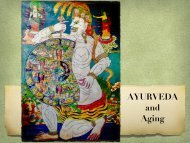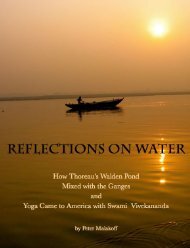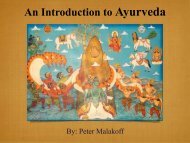How Thoreau's Walden Pond Mixed with the Ganges and Yoga Came to America with Swami Vivekananda
One early morning in 1846, during the coldest days of a New England winter, Henry David Thoreau looked out the window of his small cabin on Walden Pond and saw men cutting its ice into blocks. That ice was hauled by horse to a railroad that ran across the western edge of Walden Pond, packed into a boxcar, taken to Boston and loaded onto a clipper ship that sailed to Calcutta, India, arriving about four months later. Once there, that ice was purchased by grateful members of the East India Company. Thoreau had witnessed a small part of the global ice trade between New England and India that took place during the latter part of the nineteenth century. When Thoreau considered the ice trade, his vision sailed on metaphors far beyond the scope of business. The waters he imagined flowed both east and west and carried not just natural elements, but culture, religion and philosophy as well. He envisioned that after arriving in Calcutta, the New England ice of Walden Pond would eventually melt and run downhill where it would join with the sacred water of the Ganges. He wrote in Walden: "It appears that the sweltering inhabitants of Charleston and New Orleans, of Madras and Bombay and , drink at my well. In the morning I bathe my intellect in the stupendous and cosmogonal philosophy of the , since whose composition years of the gods have elapsed, and in comparison with which our modern world and its literature seem puny and trivial; and I doubt if that philosophy is not to be referred to a previous state of existence, so remote is its sublimity from our conceptions. I lay down the book [Bhagavad-Gita] and go to my well for water, and lo! there I meet the servant of the Bramin, priest of and and who still sits in his temple on the Ganges reading the , or dwells at the root of a tree with his crust and water jug. I meet his servant come to draw water for his master, and our buckets as it were grate together in the same well. The pure Walden water is mingled with the sacred water of the Ganges." This book tells the story of these waters . . .
One early morning in 1846, during the coldest days of a New England winter, Henry David Thoreau looked out the window of his small cabin on Walden Pond and saw men cutting its ice into blocks. That ice was hauled by horse to a railroad that ran across the western edge of Walden Pond, packed into a boxcar, taken to Boston and loaded onto a clipper ship that sailed to Calcutta, India, arriving about four months later. Once there, that ice was purchased by grateful members of the East India Company. Thoreau had witnessed a small part of the global ice trade between New England and India that took place during the latter part of the nineteenth century.
When Thoreau considered the ice trade, his vision sailed on metaphors far beyond the scope of business. The waters he imagined flowed both east and west and carried not just natural elements, but culture, religion and philosophy as well. He envisioned that after arriving in Calcutta, the New England ice of Walden Pond would eventually melt and run downhill where it would join with the sacred water of the Ganges. He wrote in Walden: "It appears that the sweltering inhabitants of Charleston and New Orleans, of Madras and Bombay and , drink at my well. In the morning I bathe my intellect in the stupendous and cosmogonal philosophy of the , since whose composition years of the gods have elapsed, and in comparison with which our modern world and its literature seem puny and trivial; and I doubt if that philosophy is not to be referred to a previous state of existence, so remote is its sublimity from our conceptions.
I lay down the book [Bhagavad-Gita] and go to my well for water, and lo! there I meet the servant of the Bramin, priest of and and who still sits in his temple on the Ganges reading the , or dwells at the root of a tree with his crust and water jug. I meet his servant come to draw water for his master, and our buckets as it were grate together in the same well. The pure Walden water is mingled with the sacred water of the Ganges."
This book tells the story of these waters . . .
Create successful ePaper yourself
Turn your PDF publications into a flip-book with our unique Google optimized e-Paper software.
apid on your way. You can take <strong>the</strong> rudder of <strong>the</strong> boat of your life <strong>and</strong> steer.”<br />
I was struck dumb by his answer. Awakening as if from a dream, I saw<br />
ano<strong>the</strong>r way of approaching life: yes, I was being carried by great flowing<br />
waters, but I could also steer my boat down that river!<br />
Like every o<strong>the</strong>r time in his<strong>to</strong>ry, we live in a pivotal moment. Things can<br />
get better, stay <strong>the</strong> same or get worse <strong>and</strong> we are each responsible for where<br />
we are <strong>and</strong> what occurs. This is why education, underst<strong>and</strong>ing of his<strong>to</strong>ry <strong>and</strong><br />
s<strong>to</strong>ries are so important: <strong>with</strong>out <strong>the</strong>m, we might not recognize that we are<br />
going down <strong>the</strong> road <strong>to</strong> a bad place someone else had traveled <strong>to</strong> a long time<br />
ago.<br />
Vivekan<strong>and</strong>a taught “Practical Vedanta,” Vedanta set free from exclusive<br />
association <strong>with</strong> Hinduism or any o<strong>the</strong>r religion or culture. On <strong>the</strong> eighth day<br />
of <strong>the</strong> Parliament he presented his “Paper on Hinduism.” In it he offered a<br />
taste of <strong>the</strong> mingled waters of Vedanta <strong>and</strong> Christianity:<br />
“A Vedic sage s<strong>to</strong>od up before <strong>the</strong> world <strong>and</strong> in trumpet voice<br />
proclaimed <strong>the</strong> glad tidings: ‘Hear, ye children of immortal bliss!<br />
Even ye that reside in higher spheres! I have found <strong>the</strong> Ancient One<br />
who is beyond all darkness, all delusion: knowing Him alone you<br />
shall be saved from death over again.’ ‘Children of immortal bliss’ –<br />
what a sweet, what a hopeful name! Allow me <strong>to</strong> call you, brethren,<br />
by that sweet name – heirs of immortal bliss – yea, <strong>the</strong> Hindu<br />
refuses <strong>to</strong> call you sinners. Ye are <strong>the</strong> Children of God, <strong>the</strong> sharers<br />
of immortal bliss, holy <strong>and</strong> perfect beings. Ye divinities on earth –<br />
sinners? It is a sin <strong>to</strong> call a man so; it is a st<strong>and</strong>ing libel on human<br />
nature. Come up, O lions, <strong>and</strong> shake off <strong>the</strong> delusion that you are<br />
sheep; you are souls immortal, spirits free, blest <strong>and</strong> eternal; ye are<br />
not matter, ye are not bodies; matter is your servant, not you <strong>the</strong><br />
servant of matter.<br />
Thus it is that <strong>the</strong> Vedas proclaim not a dreadful combination of<br />
unforgiving laws, not an unforgiving prison of cause <strong>and</strong> effect, but<br />
100


















